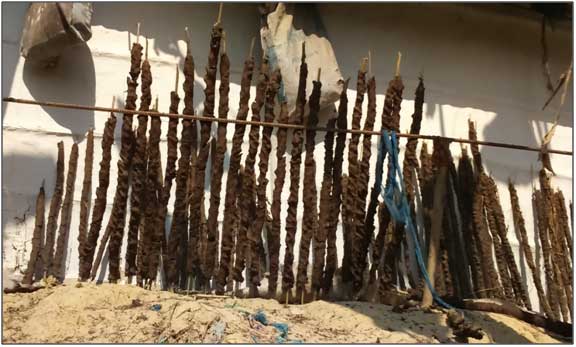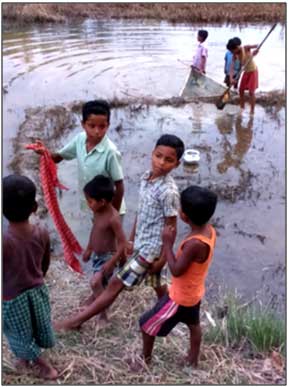Walking across the muddy road at the end of the Irongmara bazaar area (near Assam University), we reached a village, around 1 km from the bazaar. This was the time to witness the lives of a Scheduled Castes community residing in that area. These people settled in the village during British rule in India when tea plantation was first set up in Barak Valley. They are the ex-tea garden labourers who were brought to the valley as a result of large-scale immigration of labourers from Bengal and Bihar.

Muddy road to the village
As the village nears by, view of a woman carrying wood caught my eyes. They collected wood from the adjacent places, from the roadside, near the water bodies located all along the way. Even while on bus, when time was just to reach university, women collecting wood from nearby slopes; or within the campus; or at the behind passage of University to Irongmara; it’s quite common to see such women collecting woods or sticks in scorching heat of summers or cold freezing winters; sometimes alone, sometimes in pairs or groups, or even with a baby who is seated nearby or playing in the mud. Yes, it’s their work. Not only these SC women, rather majority of the women in India have to take the responsibility of cooking because this task has been assigned to them by society. But unlike the other women, these women are to get the fuel ready themselves because they cannot afford to buy gas. Their mud oven lit with dry leaves, sticks and a special kind of fuel they prepare with cow dung and tea branches or sticks.
While women’s work is the most painful, men of the family have the main work of fishing. They catch fish from the jheel (water body) and also from the wet rice fields. From early morning they would begin their work and sell to men in bazaar as well as those who go door to door and sell the fish. For the second half it was the afternoon time when they catch fish. Even the children have also learnt the art of catching fish from elders. When the children return from school, they go to the jheel with a net and catch fish. However it’s the work of the young boys.
As to the young girls, school is an impossible dream which can’t be achieved by majority of them. They have to stay in home to do the household chores because mother has gone to collect wood from forest, father went to catch fish. They clean home, broom the mud houses, help grandfather and grandmother in their work, wash clothes, utensils and if possible help mothers (when she returns) as the youngest child of the house is always there to be taken care of. This is the order of living of most of the ex-untouchable households in the village. They think that it is their fate and they cannot change it which reminds me of Babasaheb Ambedkar who wrote in his analysis of Hindu Social Order:
“It [Hindu Social Order] has fixed the social status of the lower orders for all generations to come. Their economic status is also fixed. There being no disparity between the two, there is no possibility of a grievance growing up. It has denied education to the lower orders. The result is that no one is conscious that his low condition is a ground for grievance. If there is any consciousness it is that no one is responsible for the low condition. It is the result of fate”.
It’s not fate but graded inequality which needs to be unmasked. And education is the only means of liberation from such inequality that exist not only in that village, or Assam or India; but in every existent society throughout the world in varied forms.

A woman carrying bundle of dry tree branches

Women prepared Fuel with Cow Dung and Dry Sticks

Children catching fish in the Jheel (water body) nearby

Young Girl at home, Elderly man working at home
Author’s Bio: Ruman Sutradhar is a PhD scholar with Assam University. She is currently working as Assistant Professor at Samuktala Sidhu Kanhu College. She has published articles on her areas of research interest which include gender studies, marginalized groups and Dalit studies. She can be reached at Email: [email protected]
SIGN UP FOR COUNTERCURRENTS DAILY NEWS LETTER









































